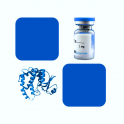
- Remove this product from my favorite's list.
- Add this product to my list of favorites.
Products
Viewed products
Newsletter
 |  |  |  |  |  |

Background
Tumor necrosis factor ligand superfamily member 9 (4-1BBL) is also known as 4-1BB ligand, CD137L or TNFSF9, which is a cytokine that binds to TNFRSF9. 4-1BBL is the high affinity ligand of 4-1BB. 4-1BBL induces the proliferation of activated peripheral blood T-cells. Also, 4-1BBL may have a role in activation-induced cell death (AICD). Furthermore, 4-1BBL may play a role in cognate interactions between T-cells and B-cells/macrophages. As for diseases, 4-1BBL is involved in cancers, infectious diseases and autoimmune diseases.
Source
Recombinant Biotinylated Human 4-1BB Ligand Protein, Fc,Avitag, premium grade(41L-H82F9) is expressed from human 293 cells (HEK293). It contains AA Ala 50 - Glu 254 (Accession # P41273-1).
Predicted N-terminus: Ala 50
It is produced under our rigorous quality control system that incorporates a comprehensive set of tests including sterility and endotoxin tests. Product performance is carefully validated and tested for compatibility for cell culture use or any other applications in the early preclinical stage. When ready to transition into later clinical phases, we also offer a custom GMP protein service that tailors to your needs. We will work with you to customize and develop a GMP-grade product in accordance with your requests that also meets the requirements for raw and ancillary materials use in cell manufacturing of cell-based therapies.
Molecular Characterization
This protein carries a human IgG1 Fc tag at the C-terminus, followed by an Avi tag (Avitag™).
The protein has a calculated MW of 50.2 kDa. The protein migrates as 50-55 kDa under reducing (R) condition (SDS-PAGE) due to glycosylation.
Biotinylation
Biotinylation of this product is performed using Avitag™ technology. Briefly, the single lysine residue in the Avitag is enzymatically labeled with biotin.
Biotin:Protein Ratio
Passed as determined by the HABA assay / binding ELISA.
Endotoxin
Less than 0.1 EU per μg by the LAL method.
Sterility
Negative
Mycoplasma
Negative.
Purity
>95% as determined by SDS-PAGE.
Formulation
Lyophilized from 0.22 μm filtered solution in PBS, pH7.4 with trehalose as protectant.
Reconstitution
Please see Certificate of Analysis for specific instructions.
For best performance, we strongly recommend you to follow the reconstitution protocol provided in the CoA.
Storage
For long term storage, the product should be stored at lyophilized state at -20°C or lower.
Please avoid repeated freeze-thaw cycles.
This product is stable after storage at:
-20°C to -70°C for 12 months in lyophilized state;
-70°C for 3 months under sterile conditions after reconstitution.
Bioactivity
Please refer to product data sheet.
(1) "Intratumoral delivery of lipid nanoparticle-formulated mRNA encoding IL-21, IL-7, and 4-1BBL induces systemic anti-tumor immunity"
Hamouda, Filtjens, Brabants et al
Nat Commun (2024) 15 (1), 10635
(2) "Local treatment of HVJ-E with T cell costimulatory molecule stimulation elicits systemic anti-tumor effects"
Ishibashi, Li, Hisatomi et al
Mol Ther Oncol (2024) 32 (4), 200893
(3) "In-depth cross-validation of human and mouse CD4-specific minibodies for noninvasive PET imaging of CD4+ cells and response prediction to cancer immunotherapy"
Pezzana, Blaess, Kortendieck et al
Theranostics (2024) 14 (12), 4582-4597
Showing 1-3 of 789 papers.
Follow us